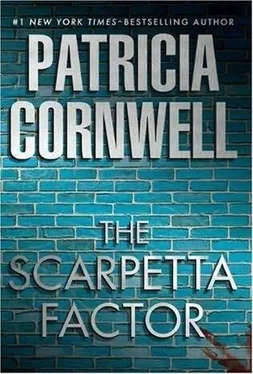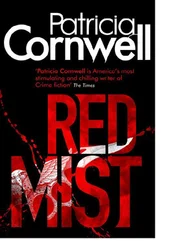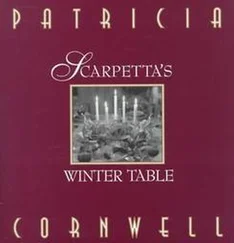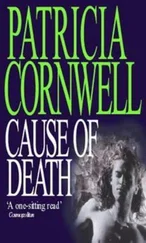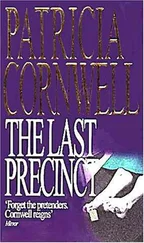What a crock of shit. Their only child, Rocco, left home, got involved in organized crime, and was dead, and Doris ran off with a car salesman and might as well be dead, and during Marino’s time in Richmond, it had one of the highest homicide rates per capita in the United States. The drug dealers’ rest stop along the I-95 corridor between New York and Miami, where dirtbags did business en route because Richmond had the customer base, seven federal housing projects. Plantations and slavery. What goes around comes around. Richmond was a good place to deal drugs and kill people, because the cops were stupid, that was the word on the street and along the Corridor, up and down the East Coast. Used to offend the hell out of Marino. Not anymore. It was so long ago, and what good did it do to take things personally when they weren’t personal. Most things were random.
The older he got, the less he could connect one event in his life to another in a way that showed evidence of something intelligent and caring behind his choices and messes and the messes of those crossing his borders, especially women. How many had he loved and lost or simply fucked? He remembered the first time, clear as day. Bear Mountain State Park on the dock overlooking the Hudson when he was sixteen. But overall, he had no clue, all those times he was drunk, how could he remember? Computers didn’t get drunk or forget, had no regrets, didn’t care. They connected everything, created logical trees on the data wall. Marino was afraid of his own data wall. He was afraid it didn’t make sense, was afraid that almost every decision he’d ever made was a bad one with no rhyme or reason to it, no Master Plan. He didn’t want to see how many offshoots went nowhere or were linked to Scarpetta. In a way, she had become the icon in the center of his connections and disconnections. In a way, she made the most sense and the least.
“I keep thinking you can match up images and photographs,” Marino said to Petrowski while looking at the jumper on the flat screen. “Like if this FedEx guy’s mug shot is in some database and you got his facial features and the tattoo to connect with what we got here from the security camera.”
“I see what you’re saying. Except I think we’ve established he’s not really FedEx.”
“So, you get the computer to do its data-mining thing and match the images.”
“We search by keyword or category. Not by image. Maybe someday,” Petrowski said.
“Then how come you can Google images like photographs you want and download them?” Marino asked.
He couldn’t take his eyes off the jumper. It was true. He must have changed his mind. What had changed it? Fear of heights? Or was it all the fucking attention. Jesus. Choppers, cops, and live TV. Maybe he decided to hang around, be on the cover of People magazine.
“Because you’re searching by keywords, not by the actual image,” Petrowski patiently explained. “An image-search application requires a keyword or several keywords, such as, well, see our logo on the wall over there? You search on the keywords RTCC logo or moniker and the software finds an image or images that includes those same keywords-actually finds the hosting location.”
“The wall?” Marino was confused as he looked at the wall with the logo, an eagle and American flags.
“No, the hosting location isn’t the wall. It’s a database-in our case, a data warehouse because of the massive size and complexity since we started centralizing. Every warrant; offense and incident report; weapon; map; arrest; complaint; C-summons; stop, question, and frisk; juvenile crime; you name it. Same type of link analysis we’re doing in counterterrorism,” Petrowski said.
“Right. And if you could connect images,” Marino said, “you could identify terrorists, different names but the same person, so why aren’t we? Okay. They’ve almost got him. Jesus. Like we should rappel off the bridge for some squirrel like that.”
ESU cops in harnesses were suspended by ropes, closing in on three sides.
“We can’t. Maybe someday,” Petrowski answered, oblivious to the jumper and whether he made it or not. “What we link is public records, like addresses, locations, objects, other large collections of data, but not actual photographs of faces. What you’re really getting a hit on is the keywords, not the images of tattoos. Am I making sense? Because I don’t feel you’re clear on what I’ve been saying. Maybe if your attention was here in the room with me instead of on the GW Bridge.”
“I wish I could see his face better,” Marino said to the flat screen with the jumper on it. “Something about him. Like I know him from somewhere.”
“From everywhere. A dime a dozen these days. It’s selfish as hell. If you want to do yourself in, don’t take out other people with you, don’t put them at risk, don’t cost the taxpayers. They’ll slap him in Bellevue tonight. Tomorrow we’ll find out he was involved in a Ponzi scam. We’ve just had a hundred million cut out of our budget, and here we are snatching his ass off a bridge. A week from now, he’ll kill himself some other way.”
“Naw. He’ll be on Letterman,” Marino said.
“Don’t push my button.”
“Go back to that Mount Rushmore wino tattoo you had up a minute ago,” Marino said, reaching for his coffee as the ESU cops risked their lives to rescue someone who wasn’t worth it, was a dime a dozen and probably should have splashed down by now, been picked up by the Coast Guard and escorted to the morgue.
Petrowski clicked on a record he had opened earlier and, using the mouse, dragged an image into a big empty square on a laptop screen. A mug shot appeared on the data wall, a black man with a tattoo covering the right side of his neck: four skulls in an outcropping of rocks, what looked like Mount Rushmore to Marino, and the Latin phrase In vino veritas.
“Bottle of wine, fruit of the vine,” Marino said, and two ESU cops almost had the jumper. Marino couldn’t see his face, couldn’t see what he was feeling or if he was talking.
“In wine is truth,” Petrowski said. “Think it goes back to ancient Roman times. What the hell’s his name. Pliny Something. Maybe Tacitus.”
“Mateus and Lancers rosé. Remember those days?”
Petrowski smiled but didn’t answer. He was too young, probably had never heard of Mad Dog or Boone’s Farm, either.
“Drink a bottle of Lancers in the car, and if you got lucky, you give your date the bottle for a souvenir,” Marino went on. “The girls would put candles in them, let all the wax run down, lots of different color candles. What I called a candle fuck. Well, guess you had to be there.”
Petrowski and his smile. Marino was never sure what it meant except he figured the guy was wrapped pretty tight. Most computer jockeys were, except Lucy. She wasn’t even wrapped, not these days. He glanced at his watch, wondered how she and Berger were making out with Hap Judd as Petrowski arranged images side by side on the data wall. The tattoo on the neck of the man in the FedEx cap was juxtaposed with the tattoo of four skulls and the phrase In vino veritas.
“Nope.” Marino took another swallow of coffee, black and cold. “Not even close when you really look.”
“I tried to tell you.”
“I was thinking of patterns, like maybe where he got the tattoo. If we found something that was the same design, I could track down the tattoo artist, show him a picture of this FedEx guy,” Marino said.
“It’s not in the database,” Petrowski said. “Not with those keywords. Not with coffin, either, or fallen comrade or Iraq or anything we’ve tried. We need a name, an incident, a location, a map, something.”
“What about the FBI, their database?” Marino suggested. “That new billion-dollar computer system they got, forget what it’s called.”
Читать дальше
